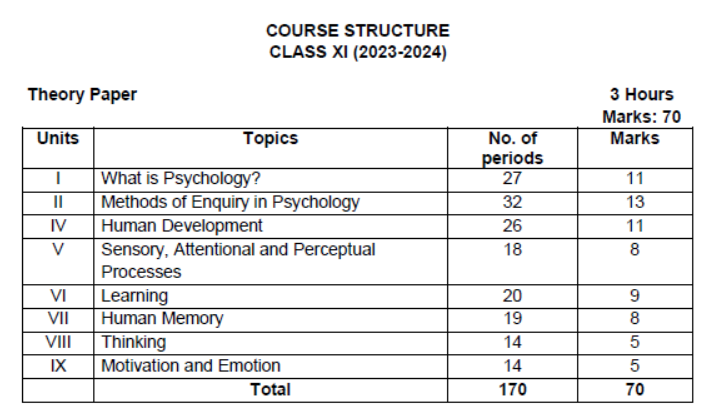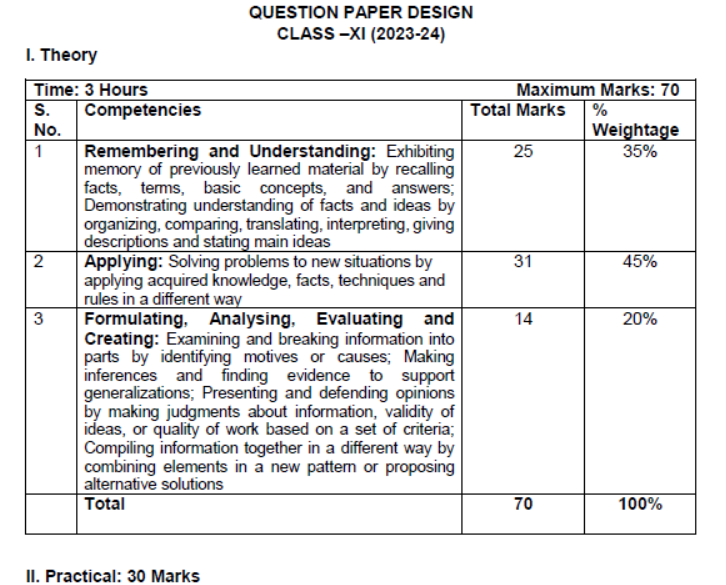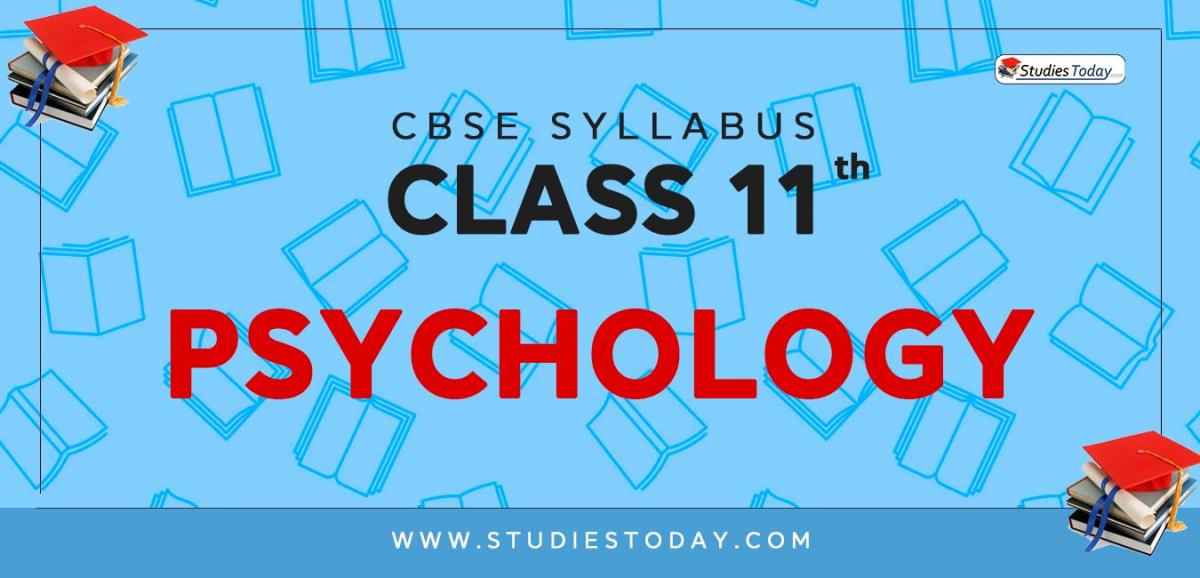Download CBSE Class 11 Syllabus for Psychology 2023 2024. Refer to the latest syllabus provided below and free download latest curriculum of Class 11 for Psychology issued by CBSE and NCERT, free download in pdf, get topic wise weightage, suggested readings and books based on latest syllabus and guidelines. The Psychology Class 11 Syllabus curriculum has been developed and issued by CBSE and NCERT for Psychology in Class 11. All students studying in Class 11 are suggested to go through latest syllabus to ensure that their preparation is as per the latest syllabus issued by CBSE NCERT KVS. Class 11 Psychology students should do preparation for Psychology exam strictly based on the latest curriculum and concentrate more on the topics with higher weightage to help them score higher marks in Class 11 Psychology class tests and exams
Class 11 Psychology Syllabus
It is important for students to study as per the latest Class 11 Psychology curriculum and marks breakup as per important topics. This will help to prepare properly for the upcoming examination. You can click on the following links to download the latest and past year syllabus provided by us below.
Year Wise Psychology Syllabus Class 11

COURSE STRUCTURE
Unit I What is Psychology? 27 Periods
The topics in this unit are:
1. Introduction
2. What is Psychology?
- Psychology as a Discipline
- Psychology as a Natural Science
- Psychology as a Social Science
3. Understanding Mind and Behaviour
4. Popular Notions about the Discipline of Psychology
5. Evolution of Psychology
6. Development of Psychology in India
7. Branches of Psychology
8. Psychology and Other Disciplines
9. Psychology in Everyday Life
Unit II Methods of Enquiry in Psychology 32 Periods
The topics in this unit are:
1. Introduction
2. Goals of Psychological Enquiry
- Steps in Conducting Scientific Research
- Alternative Paradigms of Research
3. Nature of Psychological Data
4. Some Important Methods in Psychology
- Observational Method
- Experimental Method
- Correlational Research
- Survey Research
- Psychological Testing
- Case Study
5. Analysis of Data
- Quantitative Method
- Qualitative Method
6. Limitations of Psychological Enquiry
7. Ethical Issues
Unit IV Human Development 26 Periods
The topics in this unit are:
1. Introduction
2. Meaning of Development
- Life-Span Perspective on Development
3. Factors Influencing Development
4. Context of Development
5. Overview of Developmental Stages
- Prenatal Stage
- Infancy
- Childhood
- Challenges of Adolescence
- Adulthood and Old Age
Unit V Sensory, Attentional and Perceptual Processes 18 Periods
The topics in this unit are:
1. Introduction
2. Knowing the world
3. Nature and varieties of Stimulus
4. Sense Modalities
- Functional limitation of sense organs
5. Attentional Processes
- Selective Attention
- Sustained Attention
- Alternative Paradigms of Research
3. Nature of Psychological Data
4. Some Important Methods in Psychology
- Observational Method
- Experimental Method
- Correlational Research
- Survey Research
- Psychological Testing
- Case Study
5. Analysis of Data
- Quantitative Method
- Qualitative Method
6. Limitations of Psychological Enquiry
7. Ethical Issues
Unit IV Human Development 26 Periods
The topics in this unit are:
1. Introduction
2. Meaning of Development
- Life-Span Perspective on Development
3. Factors Influencing Development
4. Context of Development
5. Overview of Developmental Stages
- Prenatal Stage
- Infancy
- Childhood
- Challenges of Adolescence
- Adulthood and Old Age
Unit V Sensory, Attentional and Perceptual Processes 18 Periods
The topics in this unit are:
1. Introduction
2. Knowing the world
3. Nature and varieties of Stimulus
4. Sense Modalities
- Functional limitation of sense organs
5. Attentional Processes
- Selective Attention
- Sustained Attention
6. Perceptual Processes
- Processing Approaches in Perception
7. The Perceiver
8. Principles of Perceptual Organisation
9. Perception of Space, Depth and Distance
- Monocular Cues and Binocular Cues
10. Perceptual Constancies
11. Illusions
12. Socio-Cultural Influences on Perception
Unit VI Learning 20 Periods
The topics in this unit are:
1. Introduction
2. Nature of Learning
3. Paradigms of Learning
4. Classical Conditioning
- Determinants of Classical Conditioning
5. Operant/Instrumental Conditioning
- Determinants of Operant Conditioning
- Key Learning Processes
6. Observational Learning
7. Cognitive Learning
8. Verbal Learning
9. Skill Learning
10. Factors Facilitating Learning
11. Learning Disabilities
Unit VII Human Memory 19 Periods
The topics in this unit are:
1. Introduction
2. Nature of memory
3. Information Processing Approach : The Stage Model
4. Memory Systems : Sensory, Short-term and Long-term Memories
5. Levels of Processing
6. Types of Long-term Memory
- Declarative and Procedural; Episodic and Semantic
7. Nature and Causes of Forgetting
- Forgetting due to Trace Decay, Interference and Retrieval Failure
8. Enhancing Memory
- Mnemonics using Images and Organisation
Unit VIII Thinking 14 Periods
The topics in this unit are:
1. Introduction
2. Nature of Thinking
- Building Blocks of Thought
3. The Processes of Thinking
4. Problem Solving
5. Reasoning
6. Decision-making
7. Nature and Process of Creative Thinking
- Nature of Creative Thinking
- Process of Creative Thinking
8. Thought and Language
9. Development of Language and Language Use
Unit IX Motivation and Emotion 14 Periods
The topics in this unit are:
1. Introduction
2. Nature of Motivation
3. Types of Motives
- Biological Motives
- Psychosocial Motives
4. Maslow’s Hierarchy of Needs
5. Nature of Emotions
6. Expression of Emotions
- Culture and Emotional Expression
- Culture and Emotional Labelling
7. Managing Negative Emotions
8. Enhancing Positive Emotions
Practical (Projects, experiments, small studies, etc.) 30 marks 60 Periods
The students shall be required to undertake one project and conduct two experiments. The project would involve the use of different methods of enquiry like observation, survey, interview, questionnaire, small studies related to the topics covered in the course (e.g. Human
development, Learning, Memory, Motivation, Perception, Attention and Thinking). Experiments could focus on cause-and-effect relationship.
Practical Examination
- Practical (Experiments) file 05 Marks
- Project File 05 Marks
- Viva Voce (Project and experiments) 05 Marks
- One experiment (05 marks for conduct of
experiment and 10 marks for reporting) 15 Marks
Total 30 Marks

You can download the CBSE 2025 Syllabus for Class 11 Psychology for latest session from StudiesToday.com
Yes, you can click on the links above and download Syllabus in PDF for Class 11 for Psychology
Yes, the syllabus issued for Class 11 Psychology have been made available here for latest 2025 academic session
You can easily access the links above and download the Class 11 Syllabus Psychology
There is no charge for the Syllabus for Class 11 CBSE Psychology you can download everything free
Planning your studies as per syllabus given on studiestoday for Class 11 subject Psychology can help you to score better marks in exams
Yes, studiestoday.com provides all latest CBSE Class 11 Psychology Syllabus with suggested books for current academic session
Yes, studiestoday provides curriculum in Pdf for Class 11 Psychology in mobile-friendly format and can be accessed on smartphones and tablets.
Yes, syllabus for Class 11 Psychology is available in multiple languages, including English, Hindi


